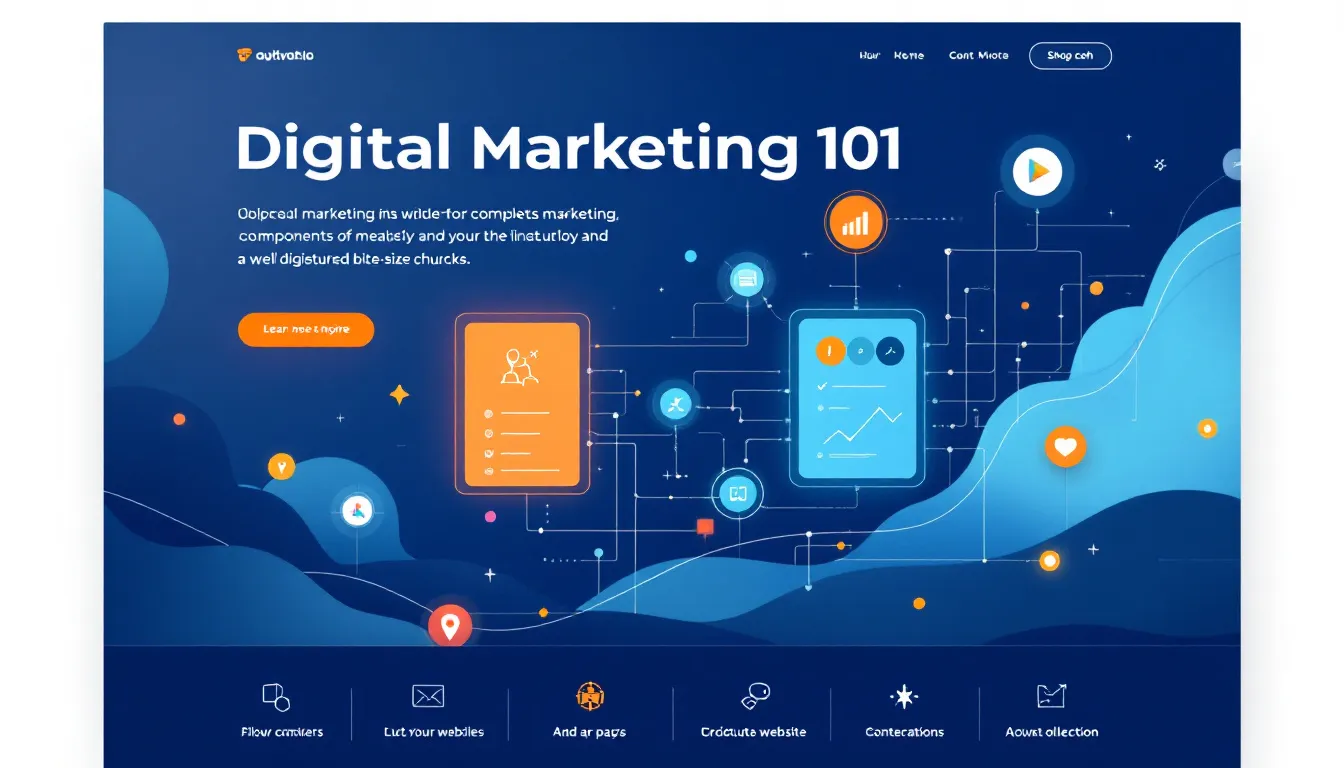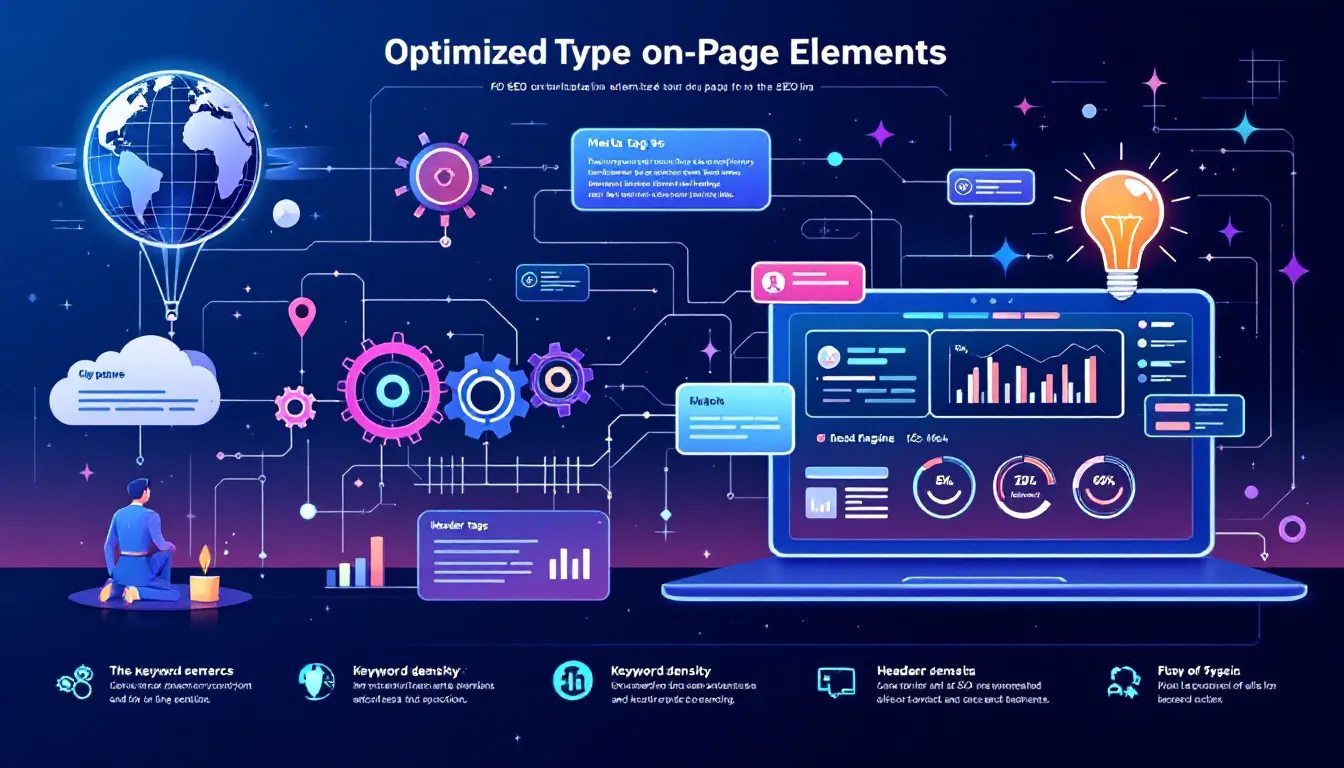SEO is essential for improving your website’s search engine visibility and driving organic traffic. This article will walk you through actionable steps to seo your website, including keyword research, optimizing on-page elements, and building backlinks.
Key Takeaways
-
Establish a solid SEO foundation by choosing an effective domain name, selecting a mobile-responsive theme, ensuring security with SSL certificates, and optimizing for mobile devices.
-
Conduct thorough keyword research and understand search intent to optimize content better, utilizing tools like Google Keyword Planner and analyzing competitors for insights.
-
Regularly monitor SEO performance through Google Search Console and Google Analytics, and adjust strategies based on data to continuously improve visibility and effectiveness.
Set Up Your Website for SEO Success

Establishing a robust foundation for your website in terms of search engine optimization is comparable to constructing the base of a towering skyscraper. This strong groundwork supports all subsequent SEO efforts. By optimizing your website for search engines right from the start, you can avoid numerous potential problems later on.
We should examine the critical components that are foundational to creating an effective SEO strategy.
Get a Domain Name
Your website’s domain name serves as its signature identifier. It must be straightforward to spell, articulate, and above all, easy for people to remember. Consider it the online representation of your brand’s identity.
Take Sass and SEO for instance. Their web address is sassandseo.com—a direct and simple-to-remember URL.
Select a Theme
Selecting an appropriate theme for your website is essential. A theme that matches the visual identity of your brand not only boosts recognition but also guarantees a uniform experience for users across various devices.
Choose a theme that responds well on mobile and offers options to tailor it according to the particular requirements of your business.
Prioritize Security
Securing your website is crucial. By utilizing an SSL certificate, you can encrypt the data of those who visit your site, thereby boosting their confidence in its safety and potentially elevating your position in search engine results. You might obtain a complimentary SSL from several web hosting services or alternatively apply a plugin to set it up.
Optimize for Mobile Devices
It’s imperative that your website be optimized for mobile use, as search engines now favor sites that are mobile-friendly. This ensures that your website is responsive and offers a smooth user experience on handheld devices.
To evaluate how well your site performs on mobile platforms, visit it using a smartphone or tablet.
Conduct Comprehensive Keyword Research

The foundation of your SEO strategy lies in keyword research, which uncovers the phrases and terms utilized by your target audience. By tailoring your content to align with these search queries, you can enhance the likelihood that your website will surface in pertinent search results. This not only boosts organic traffic but also elevates your position in search rankings.
Understand Search Intent
Grasping the concept of search intent is essential, as it enables you to craft content that aligns with user expectations and boosts relevance. Search intent falls into four categories: informational, navigational, transactional, and commercial investigation. By understanding these types of intents, you can ensure your content fulfills the needs of users.
Use Google Keyword Planner
The Google Keyword Planner is an effective instrument for conducting keyword research. It offers valuable data on the competition and search volume, aiding in the selection of ideal keywords.
By entering your desired keyword into this tool, you can access pertinent results from search engines and adjust your content strategy to match these insights.
Analyze Competitors
Examining the keyword strategies of your competitors can uncover unexploited areas in the market and inform the choice of keywords for your campaign. Through understanding their tactics, you have the chance to spot potential openings and enhance your approach to keyword targeting, thereby boosting both your online presence and search performance.
Structure Your Website for Optimal SEO

A clear and organized website structure is essential for both user experience and SEO. It helps search engines crawl and index your content efficiently.
Let’s explore how to create a logical hierarchy, develop a sitemap, and implement internal linking to enhance your site’s SEO.
Create a Logical Hierarchy
Establishing a coherent structure for your website not only improves the experience for users, but also aids search engines in grasping the arrangement of your content.
Construct an XML sitemap that reflects the architecture of your site, which supports search engines during their crawling and indexing processes.
Develop a Sitemap
A sitemap in XML format acts as a navigational guide for search engines, enabling them to find and catalog the content of your website more effectively. This instrument is essential to guarantee that each significant page on your site is explored and indexed.
Implement Internal Linking
Internal links are crucial for spreading authority throughout your site and boosting SEO performance. They not only help users find related content and enhance navigation, but also indicate the relevance of your pages to search engines.
Optimize On-Page Elements

On-page SEO encompasses the enhancement of both the observable and hidden components of your web pages to elevate their ranking in search engine results. It entails formulating enticing title tags, composing captivating meta descriptions, and refining images for optimization.
Craft Compelling Title Tags
Title tags are clickable headlines that appear in search results. They should clearly describe the page’s content while integrating relevant keywords naturally, including page titles.
Effective title tags improve the relevance of your page in search results.
Write Engaging Meta Descriptions
A meta description offers a brief overview of what to expect on a webpage, displayed below the title within search results. It is crucial for this summary to contain relevant keywords and be distinct for every page in order to entice individuals searching online to click through and explore further.
Optimize Images
Enhancing search visibility and boosting accessibility are key benefits of optimizing images for SEO. It is essential to use alt text and descriptive filenames, include pertinent keywords, and supplement with captions to provide extra context for images.
Create High-Quality Content
High-quality content is the cornerstone of effective SEO. It should address specific audience pain points, be informative and well-researched, and attract backlinks.
Focus on E-E-A-T signals, target long-tail keywords, and regularly update your content to keep it relevant.
Focus on E-E-A-T Signals
E-E-A-T represents the crucial elements of Expertise, Experience, Authoritativeness, and Trustworthiness. These components are vital for both enhancing search rankings and cultivating trust among readers.
Utilizing E-E-A-T as a benchmark, Google determines the caliber of webpages by examining a multitude of factors pertinent to the content on websites.
Target Long-Tail Keywords
To improve conversion rates, focus on long-tail keywords that are specific to your target audience’s search habits. Use Google Keyword Planner to find these relevant keywords that have a substantial search volume but face less competition.
Update and Refresh Content Regularly
Regularly updating your website’s content ensures that the information remains precise and pertinent, which not only captivates users, but also fosters credibility.
Websites that frequently renew their material are preferred by search engines, which can lead to enhanced rankings.
Build Backlinks for Authority
Building backlinks is critical for SEO as they signal trustworthiness to search algorithms. Quality links are preferred over a large quantity of links.
Engage in guest blogging, network with industry influencers, and create link-worthy content to build quality backlinks.
Engage in Guest Blogging
Writing guest articles for well-known blogs can greatly enhance your online presence and bring in high-quality backlinks.
Focus on pinpointing respected websites and creating content that strengthens connections within your field.
Network with Industry Influencers
Establishing connections with key industry figures can greatly enhance the chances of obtaining backlinks and shoutouts for your site.
Engage in contributing guest blog posts, circulate your material on social media platforms, and become an active member of internet forums to foster natural relationships.
Create Link-Worthy Content
Link-worthy content is typically content-rich, authoritative, unbiased, and educational. Using descriptive links rather than ‘click here’ improves SEO and provides value to readers.
Create high-quality content that attracts more backlinks.
Leverage Technical SEO
Technical SEO is essential for ensuring your website adheres to the technical standards of search engines, encompassing enhancement of page speed, utilization of structured data, and rectification of broken links. These components are vital for optimizing your site for search engine visibility.
Improve Page Speed
Page speed is essential for user experience and SEO. Compress images, minimize HTTP requests, enable browser caching, and minify JavaScript, CSS, and HTML to enhance page speed.
Use Structured Data
Implementing schema markup can improve the visibility of your content in search results by helping search engines understand your content better. This structured data also enhances rich snippets, which aids in enhancing search appearance.
Fix Broken Links
Utilize tools such as Google Search Console and SEMrush to detect and rectify broken links, which can deteriorate the user experience and cause increased bounce rates. You should either update the URL, redirect it to an appropriate page, or eliminate the link entirely.
Monitor and Analyze SEO Performance

It is essential to track SEO performance in order to improve SEO strategies and increase the visibility of a website. To effectively monitor this, one should implement both Google Search Console and Google Analytics. These tools can provide valuable data that can be used to tweak and enhance your strategy using various SEO tools.
Set Up Google Search Console
The Google Search Console is a vital tool for monitoring organic search metrics, such as the number of impressions and clicks tied to particular queries. This platform aids in comprehending your website from Google’s perspective, allowing you to fine-tune it for better performance in Google Search.
Utilize Google Analytics
Utilizing Google Analytics facilitates the evaluation of where website traffic originates, which is crucial for scrutinizing how visitors interact with your site via various pathways, such as organic search results. By comprehending these traffic sources using Google Analytics, you can make calculated modifications to enhance your SEO endeavors. This tool is vital in monitoring critical indicators that shape and guide your overall SEO strategy.
Adjust Strategy Based on Data
Continuously examining data on SEO performance is essential for improving strategies and boosting the visibility of a website. Persistently tweaking your SEO approach using insights from instruments such as Google Analytics and Search Console helps maintain its effectiveness and keeps it current.
Promote Your Content
The last crucial step in SEO is to effectively disseminate your content. Crafting high-quality material is essential, but you must also take steps to guarantee it’s seen by the audience for whom it’s intended.
To achieve this, leverage platforms such as social media, engage with online groups relevant to your niche, and employ email marketing strategies. These methods serve as powerful tools to boost visibility of your content and funnel visitors towards your website.
Share on Social Media
Utilizing various social media platforms is essential for enhancing the exposure of your content and connecting with a wider audience. Employ distinct channels like Facebook, Twitter, LinkedIn, and Instagram, customizing your approach to suit each platform’s unique user demographics.
Engage with online groups that are pertinent to your field in order to contribute your knowledge and naturally disseminate your content within those communities.
Participate in Online Communities
Engaging with online forums and communities pertinent to your field enables you to showcase your knowledge, potentially establishing yourself as an industry expert. This involvement is also a strategic approach for content promotion and interaction with the demographic you aim to reach.
Use Email Marketing
Sending out frequent newsletters is an effective strategy to update your audience on fresh content and sustain their involvement. By dividing email lists into specific segments, you can tailor your messages more precisely, which boosts the likelihood of engaging recipients and enhancing click-through rates for recently released material.
Summary
To ensure your website excels in SEO, meticulous planning and implementation of multiple tactics are essential. This includes conducting keyword research, optimizing on-page components, acquiring backlinks, and utilizing technical SEO practices. Regular monitoring and evaluation of your SEO performance along with proficient content promotion is crucial to maintain a competitive edge within the dynamic online environment. By adhering to these recommendations, you will be better positioned to secure top-tier search engine placements and attract natural traffic to your site.
Frequently Asked Questions
Can I do SEO for free?
Absolutely, you can do SEO for free! Utilize powerful tools like Google Search Console, Google Analytics, and Google Lighthouse to enhance your website’s performance without spending a dime.
How much should website SEO cost?
Investing in SEO typically costs between $250 and $10,000 per month, with most businesses spending around $500 to $5,000.
Choose an option that aligns with your goals and budget to boost your online presence!
Can I do SEO on my own website?
Absolutely, you can do SEO on your own website! With dedication and the right resources, you can learn the best practices and make your site thrive.
Why is a solid SEO strategy important for businesses?
A solid SEO strategy is crucial for businesses because it boosts your website’s visibility in search engine results, attracting more organic traffic.
Embrace SEO to elevate your online presence and grow your business!
What challenges do businesses face regarding SEO?
Businesses face challenges like mastering keyword research, improving website usability, and developing effective content strategies while also needing to stay updated with ever-evolving SEO trends.
Embrace these hurdles as opportunities to grow and elevate your online presence!





